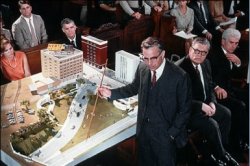Is It Really a Great Movie? Part Seven: JFK
by dan heaton
Using Roger Ebert's Great Movies book as a guide, this series of articles will focus on all films included on his list that previously have escaped my notice. Since all lists are subjective, I am not treating Ebert's choices as the essential selection of films. However, his essays offer the perfect chance for me to explore both classics and lesser-known pictures from around the globe.

Few films have generated as much controversy as Oliver Stone’s JFK, which appeared in 1991 and faced vicious attacks. While a large group of film critics hailed it as a masterpiece, many respected journalists, including Walter Cronkite, dismissed the picture as complete propaganda. Despite the negative publicity, the ambitious three-hour production received numerous awards, included the Oscars for Best Cinematography and Best Film Editing. The major awards went to Silence of the Lambs, a safer pick that has lost some of its luster during the past 15 years. A wide array of film societies from around the world cited JFK as the United States’ best movie, and it continues to provoke heated discussions 15 years after its initial release.
The film begins with a lengthy newsreel that sets the stage for the tragic assassination of one of our most popular presidents. Dwight D. Eisenhower’s pivotal speech about the growth of the military industrial complex perfectly introduces this tumultuous era. In a moving presentation, we observe a mix of historical footage and recreation of JFK’s murder that presents the events without overdoing the emotional force. Following this prologue, we join the main character, Kevin Costner’s Jim Garrison, the district attorney of New Orleans. A short time after the murder, he interrogates suspect David Ferrie (Joe Pesci), and turns him over the government. However, no charges are made, which increases suspicion that a cover-up has occurred. Several years later, some odd coincidences focus Garrison’s attention towards JFK and lead him to re-open the investigation. With the exception of his employees and a few daring speakers, no one wants to hear about the assassination, which raises even more red flags for the idealistic attorney.
The primary story follows Garrison and his troupe — who include solid character actors Michael Rooker, Wayne Knight, and Laurie Metcalf — as they slowly piece together the case for a conspiracy behind the Kennedy assassination. Especially interesting is their investigation of Lee Harvey Oswald’s (Gary Oldman) background, which is considerably deeper than you would expect from a lone gunman. Serious acting heavyweights make quick appearances and provide key information, with Jack Lemmon (Jack Martin) and Kevin Bacon (Willie O’ Keefe) giving especially strong performances. The buildup reaches its peak with the revelations of Mr. X (Donald Sutherland), a high-ranking military official who does more than imply a military coup behind the killing. As Garrison moves closer to the possible truth, his opponents use any means necessary to dismiss his character and destroy his shocking findings. The story culminates with the trial of Clay Shaw (Tommy Lee Jones), a possible minor conspirator, which provides Garrison with the chance to present his conclusions to the American public.
Entering this viewing, I expected to see a detailed investigation of the Kennedy assassination, and figured that Oliver Stone would take some leaps to reach his conclusions. What I did not expect was the story’s human side, which shows the effect of Garrison’s obsessive pursuit on his family, especially his wife Liz (Sissy Spacek). Costner has rarely been better, and he moves the lead character well beyond serving as Stone’s mouthpiece. While it educates us about the possible mysteries behind the murder, the compelling film also presents a gripping personal tale. Garrison’s highly difficult situation makes sense, and his decision to continue the case could destroy his personal life. The acting is especially strong across the board, with even the over-the-top Joe Pesci making the crazed Ferrie an understandable presence. The efforts of numerous talents help to raise the story well above a historical exploration.
Roger Ebert describes Oliver Stone as “a filmmaker of feverish energy and limitless technical skills, able to assemble a bewildering array of facts and fancies and compose them into a film without getting bogged down.” This description accurately summarizes his success in JFK, which brings tremendous energy to extremely lengthy scenes of dialogue. The most prominent example is Mr. X’s monologue, which covers a remarkable amount of information but never grows stale. Much of this film involves people talking, but it stays exciting during more than three hours. Stone may take some liberties with the facts, but his points about the conspiracy are very thought-provoking. Even reviewed apart from the questions about the assassination, this picture succeeds as a classic, fast-moving drama. It deserves the Great Movie title and remains poignant 15 years after its initial release.
Copyright (c) 2006 erasing clouds |
|